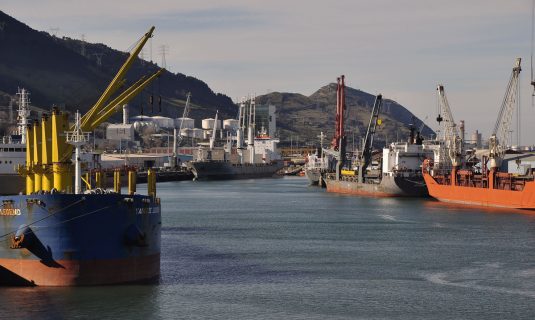The Port of Bilbao contributes to the maintenance of 11,496 work posts, which represents 1.30% of all those in the Autonomous Basque Community (CAPV) and 2.53% of employment in the Territory of Biscay. In addition, the Port’s activity contributes 881.96 million euros to GDP, which in percentage terms is 1.29% to the CAPV and 2.55% to Biscay.
This data is revealed in a study analysing the Port of Bilbao’s socio-economic contribution that Deloitte Consulting carried out for the Port Authority of Bilbao. The study analysed the impact of four activities: goods transport, industrial companies, cruise vessel traffic, and investments. Six contribution perspectives were also analysed: economic capital, structural capital, environmental capital, social capital, relational capital and reputation capital.
The economic capital section shows that companies save 318.5 million euros a year due to the existence of the Port of Bilbao, and CAPV exports/imports through the Port amounted to 13,162 million euros in 2015.
With regard to structural capital, the report underlines the fact that Bilbao is a port without any limits when it comes to vessel reception; it has more square metres of closed warehouses than any other port in Spain; customers rate its quality of services and professional experience with a 7.3/10; companies have saved more than 78,600 hours in processes thanks to the e-puertobilbao platform put into operation by the Port Authority; finally, it is connected to 859 ports worldwide.
In the environmental capital contribution, it is pointed out that 46% of the waste gathered inside the Port’s facilities is classified as recoverables; 80% of companies have implemented measures to reduce electric power consumption; in the riverside towns, the air quality is good or admissible on 99.5% of the days in the year, and 3,150 million litres of water were not

polluted because of the collection of dangerous waste in the 2011-2015 period.
Three points stand out in social capital: in 2014, 5.3% of the schoolchildren in Biscay got to know the Port through its Ezagutu Portua Programme (Basque for Know your Port); in the riverside towns, there is a ratio of 46% in the online training programme for integration into the labour market; and in the 1993-2016 period, the Port has contributed to the development of 830,000 square metres of social infrastructures.
In the field of relational capital, over 2,800 public and private agents maintain relations with the Port, and it has 60 partners in the development of international projects.
Finally, in reputation capital, global satisfaction of the Port’s customer companies is rated at 75%, while 80% of the population rates it as good or very good.
As a general conclusion, it can be confirmed from this study that the Port of Bilbao is set up as the fundamental engine of the economy in both Biscay and the CAPV as a whole, thus contributing to the generation of wealth and employment in the territory and enabling the Basque business fabric to open to new international markets.

 Port access
Port access